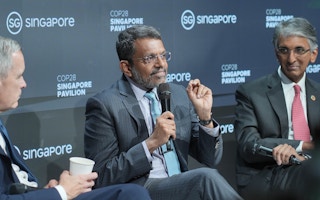If the world currently prices carbon US$100 per tonne – a figure consistent with what most climate economists have said is needed to incentivise net-zero emissions by 2050 – then a lot of the other financing mechanisms targeted at lowering the cost of capital for energy transition projects like blended finance and carbon credits, are not needed, said Singapore central bank chief Ravi Menon at the COP28 climate summit.
To continue reading, subscribe to Eco‑Business.
There's something for everyone. We offer a range of subscription plans.
- Access our stories and receive our Insights Weekly newsletter with the free EB Member plan.
- Unlock unlimited access to our content and archive with EB Circle.
- Publish your content with EB Premium.
Menon, who is managing director of the Monetary Authority of Singapore, was responding to a question about his “top wish” for scaling climate investments on a panel held at Singapore’s COP28 pavilion on Monday.
“What I would like to see is governments implementing the right price for carbon,” said Menon. “This is the elephant in the room. Nobody talks about it because governments don’t feel confident to do it. People don’t like it and in a democracy, these things don’t fly.”
Menon said his second “wish” was for a reform of the multilateral development banks’ mandates. Rather than competing with the private sector for already bankable green projects, they should be providing catalytic capital for marginally unbankable transition projects, he said.
Globally, only an estimated 30 per cent of emissions are subjected to any form of carbon pricing schemes through carbon taxes or emissions trading schemes. In 2019, Singapore became the first Southeast Asian nation – and globally among the 46 countries to date – to put a price on carbon. Its carbon tax level is set at S$5 (US$3.70) per tonne of emissions, which is below the world average of US$6.
This carbon pricing is expected to reach S$50 to S$80 (US$37-60) per tonne by 2030. The increase will be introduced in phases, starting from S$25 (US$19) next year, before rising to S$45 (US$34) in 2026.
While the city-state will take significant steps over the next few years to raise carbon taxes, the price of carbon has to go even higher, said Menon, adding that the distributional impact of these increases will need to be addressed. Environmental activists at Singapore’s climate rally held in September made the same call.
Menon had previously suggested distributing parts of the carbon tax revenues to lower-income households through carbon dividends to ensure that they do not bear the adverse impacts of carbon taxes.
Speaking on the panel alongside United Nations special envoy for climate action Mark Carney and Dilhan Pillay Sandrasegara, chief executive officer of Singapore’s state-owned investor Temasek, Menon said that just five per cent of global emissions today are currently subjected to “an appropriate carbon tax”.
Based on a scenario analysis by the Network for Greening the Financial System (NGFS), “shadow” carbon prices – a proxy for countries’ climate policies, including carbon taxes – need to reach around US$200 per tonne by 2040 to incentivise a transition towards net zero by 2050.
NGFS is a network of over 120 central banks and financial supervisors committed to scaling up green finance.
The International Monetary Fund recently raised its forecast of the average carbon price needed to meet 2030 climate goals to US$85 per tonne by the end of this decade, up from a previous estimate of US$75.
In a separate speech he gave in his capacity as NGFS chair on the same day, Menon warned that to avoid the significant losses from abrupt adjustments under a delayed and divergent transition, an “early and decisive” implementation of higher carbon prices is required.
In the absence of sufficiently high carbon prices, blended finance – a financing structure that strategically uses philanthropic or concessional sources of capital to mobilise private investment – has dominated discussions at this year’s climate talks.
On Sunday, Singapore announced the launch of a new national blended finance initiative called “Financing Asia’s Transition Partnership” (Fast-P) which seeks to mobilise up to US$5 billion to make green and transition investments in Asia.
The country’s central bank has also inked a Memorandum of Understanding with the Asian Development Bank and the Global Energy Alliance for People and Planet, which is backed by The Rockefeller Foundation, Bezos Earth Fund and Ikea Foundation. Through this partnership, all parties seek to raise up to US$2 billion in concessional and commercial capital to hasten the phase-out of coal and its replacement of renewable energy through carbon credits, in addition to the decarbonisation of other hard-to-abate sectors.





















